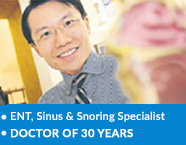Snoring, Sinus & ENT Specialist
- Dr Kenny Peter Pang
- Ear, Nose & Throat Consultant
- Otorhinolaryngologist
- MBBS MRCS(Edinburgh)(UK)
- FRCS(Edinburgh)(UK)
- FRCS(Ireland)(OTO)
- Masters Medicine (ORL)
- Founder, ASEAN Sleep Surgical Society
- Founding Member, International Surgical Sleep Society
- Member, American Academy Sleep Medicine
- Member, Singapore Sleep Society
- Member, World Sleep Society
- Board Member, Italian Sleep Disorders Board
- Member, British Association of Sleep Surgeons
- Member, European Academy of Sleep Medicine
Insomnia is defined as the inability to sleep or maintain sleep. Three types of insomnia exists :
Transient insomnia
- trouble sleeping over a period of a few nights.
Short-term insomnia
- trouble sleeping for two or three weeks.
Chronic insomnia
- poor sleep every night or most nights for more than 2 weeks.
What causes insomnia?
Insomnia may be a symptom of another problem, for example obstructive sleep apnea syndrome, a fever or other underlying medical conditions. It can be caused by any number of factors.
The 3 commonest causes of insomnia are, stress, anxiety and depression. Some other common factors include:
- Susceptibility to insomnia: Some people are more prone than others.
- Persistent stress: Problems such as an unsuccessful career, marriage problems, or a chronically ill relative may contribute to poor sleep.
- Psychiatric problems: People with depression, anxiety, schizophrenia and other psychiatric disorders have frequently disrupted and unrestful sleep.
What helps: Treatment of underlying conditions, possibly involving several types of treatment, often improves sleep.
Self Help Skills
Here are some tips for better sleep:
- Regular exercise - Aerobic exercise and general fitness is important for good health. Exercise in the evening is best and try to avoid strenuous activity before bedtime.
- Avoid large meals and excessive fluids before bedtime - This is in order to avoid reflux at night.
- Environmental control. Light, noise, and ambient room temperature is most important and can disrupt sleep. The body's biological clock is particularly sensitive to light. Parents who need to sleep during the day may have to make child care arrangements to allow them to sleep.
Treatment
Insomnia is a symptom not a diagnosis. Some simple treatments:
- Improving sleep habits
- Correcting sleep misconceptions
- Controlling your sleep environment
- Behavior management
- Light therapy Medications
Medications
Sedatives – include sedating anti-histamines to benzodiazepines. Some hyponotics include eszopiclone (Lunesta), zaleplon (Sonata), and zolpidem (Ambien).
Sleep Promoters - Melatonin is secreted by the pineal gland, a pea-sized structure at the center of your brain. At night, melatonin is produced to help your body regulate your sleep-wake cycles. The amount of melatonin produced by your body seems to decrease as you get older. Melatonin not only is a powerful anti-oxidant, but can help in promoting sleep.
Sleep Hygiene
- Go to bed at the same time each day.
- Get up from bed at the same time each day.
- Get regular exercise each day, preferably in the morning. There is good evidence that regular exercise improves restful sleep. This includes stretching and aerobic exercise.
- Get regular exposure to outdoor or bright lights, especially in the late afternoon.
- Keep the temperature in your bedroom comfortable.
- Keep the bedroom quiet when sleeping.
- Keep the bedroom dark enough to facilitate sleep.
- Use your bed only for sleep and sex.
- Take medications as directed. Its is often helpful to take prescribed sleeping pills one hour before bedtime, so they are causing drowsiness when you lie down, or 10 hours before getting up, to avoid daytime drowsiness.
- Use a relaxation exercise just before going to sleep. (eg. Muscle relaxation, imagery, massage, warm bath, etc.)
- Keep your feet and hands warm. Wear warm socks and/or mittens or gloves to bed.
- Exercise just before going to bed.
- Engage in stimulating activity just before bed, such as playing a competitive game, watching an exciting program on television or movie, or having an important discussion with a loved one.
- Have caffeine in the evening (coffee, many teas, chocolate, sodas, etc.)
- Read or watch television in bed.
- Use alcohol to help you sleep.
- Go to bed too hungry or too full.
- Take another person's sleeping pills.
- Take over-the-counter sleeping pills, without your doctor's knowledge. Tolerance can develop rapidly with these medications
- Take daytime naps.
- Command yourself to go to sleep. This only makes your mind and body more alert.
If you lie in bed awake for more than 20-30 minutes, get up, go to a different room (or different part of the bedroom), participate in a quiet activity (e.g. non-excitable reading or television), then return to bed when you feel sleepy. Do this as many times during the night as needed.






